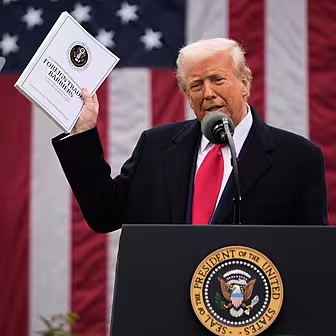British Prime Minister Theresa May has revealed the formal process for Britain to leave the EU will be triggered by the end of March.
Activating Article 50 paves the way for official Brexit talks to get under way and starts the two-year countdown for the UK's departure.
Mrs May made the announcement at the start of the Conservative Party conference in Birmingham, where the break from Brussels is set to dominate the agenda.
In an interview with the BBC, she also said she intends to introduce a "Great Repeal Bill" in the next Queen's Speech in 2017, which will scrap the legislation that took Britain into Europe 44 years ago.
The bill will end the supremacy of EU law, meaning rulings by the European Court of Justice will stop applying to the UK once the legislation takes effect.
It will also include powers to make changes to the laws using secondary legislation, but wide-ranging amendments or new laws may come forward in separate bills.
Once the European Communities Act is removed from the statute book, EU law and regulations will be converted into domestic law and subsequently removed or kept, depending on what the British parliament decides.
This process could take years - meaning many EU laws could be in force long after the day Britain formally leaves the union.
In an interview with the Sunday Times, Mrs May again said she would not hold a general election before 2020 - warning that an early vote would cause "instability".
'Hard Brexit'
The move comes as former Tory ministers ramped up pressure on Mrs May by presenting her with a "Brexit Blueprint" to take the country out the EU in less than two years.
The plan, proposed by ex-ministers Iain Duncan Smith, John Redwood, Owen Paterson and Peter Lilley, was circulated ahead of the Prime Minister's Brexit speech at the Tory party conference today.
But some Conservatives remain concerned at the move. It is understood that that former Education Secretary Nicky Morgan will issue a warning to the conference.
She is due to say that a "hard Brexit" - in which the UK rejects the EU single market and closes its borders to European citizens - could lead to bigotry.
Her speech, parts of which have been released to The Observer, will say: "There are those for whom the referendum result is not enough - they want use to have a 'hard Brexit' that cuts us off from the EU... and allows people to say things about their fellow citizens that promote intolerance and bigotry."
David Davis, the Secretary of State for Brexit, said the UK government will "take a simple approach" over changes to legislation.
He said: "EU law will be transposed into domestic law, wherever practical, on exit day.
"It will be for elected politicians here to make the changes to reflect the outcome of our negotiation and our exit."
Mr Davis added: "That is what people voted for: power and authority residing once again with the sovereign institutions of our own country."









